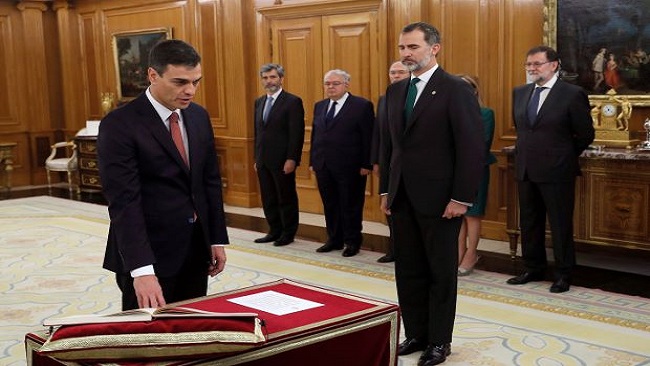Spain’s new leader appoints cabinet with majority of women
Spain’s new Prime Minister Pedro Sanchez named his cabinet on Wednesday, with women taking most of the posts at the top of government for the first time in the country’s history.
Sanchez, whose Socialist party holds just 84 of 350 parliamentary seats, was propelled into office on Friday after an unlikely alliance of anti-austerity and nationalist parties backed his bid to unseat Mariano Rajoy’s conservatives over a corruption scandal.
But he rejected calls for places in government for hard-left party Podemos, which with 67 seats was a key supporter of the no-confidence motion, and made his appointments predominantly from within the ranks of his PSOE party.
Sanchez drew from a wide range of professions, however, choosing an astronaut for science minister, a state attorney specialising in the prosecution of jihadist attacks for justice minister and a climate change treaty negotiator for environment minister.
“All are highly qualified and bring a vocation for public service and reflect the best of Spain,” Sanchez told reporters on Wednesday.
“(The new cabinet) is pro-gender equality, cross-generational, open to the world but anchored in the European Union.”
High-profile women appointees included Socialist stalwart Carmen Calvo, who becomes deputy prime minister; Budget Director-General at the European Commission Nadia Calvino, named economy minister; and state prosecutor Dolores Delgado, who becomes justice minister.
With parliament fragmented, major policy shifts will be hard for Sanchez to push through, but quick wins on consensual, popular proposals could allow him to stay in office or potentially win a snap election if the government fails to last until the end of its scheduled term in 2020.
One of his biggest challenges will be rebuilding relations with the northeastern region of Catalonia, which held a divisive referendum on independence last year that culminated in the imposition of direct rule by Madrid.
He must stay firm on his party’s support for Spanish unity, enshrined in the country’s constitution, yet open lines of communication to repair relations with the region’s re-appointed government, which remains fiercely pro-independence.
He named two Catalans to cabinet posts, though his choice of vocal pro-unity former European Parliament president Josep Borrell as foreign minister angered secessionists.
(REUTERS)





